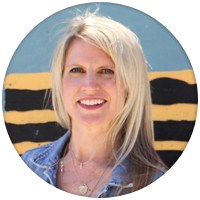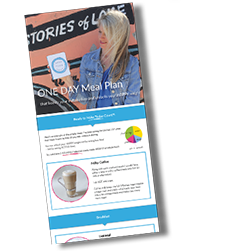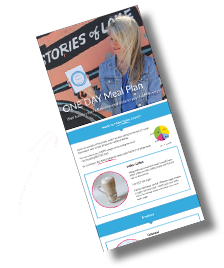
- Corey Hirsch struggled with OCD for years before being diagnosed
- I shared my OCD experience on CBC’s Ontario Today
- Mental health advocate Corey Hirsch encourages people to get help
Mental health advocate Corey Hirsch was on CBC’s Ontario Today.
Why??
It’s Mental Health Awareness Week.
Corey Hirsch was an NHL goalie. Now he’s an sports analyst. After sharing his life-long struggle with severe anxiety and obsessive compulsive disorder in the Player’s Tribune, Corey has become an outspoken mental health advocate. His goals?
- Create mental health awareness
- End the stigma around mental health
There’s always a silver lining
Corey Hirsch recently said:
It’s weird sometimes how we think the worst thing that could ever happen to us turns out to be one of the best things to ever happen to us.
– Mental health advocate Corey Hirsch
This statement is an important lesson. It reminds you to hold on when things feel hopeless.
When life brings you to unexpected places you discover things about yourself and the world that makes living richer. All the sh*t we go through is fertilizer for the future.
Mental health advocate Corey Hirsch shared his story
Each week day at noon, CBC’s Ontario Today chooses a topical issue, invites a guest or two and then opens the phone lines to hear different perspectives.
I love how CBC host Rita Celli introduced mental health advocate Corey Hirsch:
Former NHL Goalie Corey Hirsch, on how one day he snapped… How many times have we heard, if you break your arm you go to the doctors? So why don’t you go see someone if your mind is killing you? …Corey Hirsch’s story is both harrowing and reassuring.
Yup. Our most defining moments are painful and empowering.
Corey Hirsch’s struggle with OCD inspired me to call
Rita Celli opened the phone lines by asking:
Tell us about your moment when something broke. What it took to take a first step. What kind of help was there when you finally asked?
After phoning CBC’s Ontario Today about 6 times I got through; sometimes my OCD tendency to never-give-up works in my favour! Then the show’s producer asked me to tell my story. Shortly after I spoke on air.
For the longest time I kept my mental health struggles a secret. It’s hard to talk about something you don’t understand. Thankfully I’ve had the chance to reflect and learn over the last 18 years that I’ve been healthy.
It always feels good to paint a picture of what mental health looks like. Then others can look for parallels in their own behaviour and the behaviour of loved ones. When you share what you learned, it makes your difficult experience worth it.
Obsessive compulsive disorder is my underlying issue
Just like mental health advocate Corey Hirsch, my underlying issue is OCD. I had no idea I had obsessive compulsive disorder until I was in my first year of university. When I found out it was a huge relief. Learning I have OCD was the missing piece of the puzzle. This knowledge helped me understand my behaviour so I could look for self-defeating patterns and break them.
Knowledge is power.
Corey Hirsch likened OCD to a needle lodged in the groove of a record, forcing the same line of a song to get played over and over again. Another way to describe it is being stuck in a moment. This phrase perfectly describes the loop I can and still get caught in.
Here’s how OCD is described by the International OCD Foundation:
Obsessive Compulsive Disorder (OCD) is a mental health disorder that affects people of all ages and walks of life, and occurs when a person gets caught in a cycle of obsessions and compulsions. Obsessions are unwanted, intrusive thoughts, images or urges that trigger intensely distressing feelings. Compulsions are behaviors an individual engages in to attempt to get rid of the obsessions and/or decrease his or her distress.
What does OCD look like?
These days I’m better at catching myself and redirecting my energy. For example, the other day I dropped the back of an earring when I was running late to a documentary. If I was not standing with my partner, Alex and a friend, I would have stayed looking for that fastener until it was found. And I would have been extremely late for the documentary; something I cared about would have been jeopardized for something that meant nothing to me. The earring backing was plastic and I have a pack of 100 at home, which was 5 steps from where I was standing.
The way I feel in these circumstances is similar to having an itch you need to scratch. It’s a nagging feeling; something that bugs you until the task is complete. Lately I’ve gotten better at walking away and refocusing, thanks to the awareness created by people like mental health advocate Corey Hirsch.
Over the 10 years I struggled to lose weight, however, my OCD manifested itself as an eating disorder. I was always preoccupied by trying to lose weight. I felt anxious unless I was actively starving myself or overexercising; two choices that actually make it harder to lose weight.
I blamed myself instead of my weight-loss method
OCD prompts you to fix the same problem with the same solution, even if time and time again your “solution” doesn’t work. For instance, I was sure if I tried hard enough I could stick to my (self-defeating) diet. But in reality, I needed to try a new and healthier weight-loss method.
Unbeknownst to me, I needed to learn what healthy eating and exercise look like and understand how to turn my choices into healthy habits.
Instead of blaming myself for what I thought was a lack of discipline, I should have blamed my weight-loss approach.
In hindsight, it was more important to me to follow my diet perfectly, than to lose weight. I was fixated on eating exactly what I planned. It was the only way I could feel good.
Mental health is influenced by nature and nurture
I was born with a predisposition for OCD. My life experiences triggered that underlying issue.
The societies we live in have strong beliefs and attitudes toward just about everything… Our beliefs and attitudes toward our selves and our bodies are shaped in some way by cultural influences…
– National Eating Disorder Awareness Centre: Social, Cultural and Biological Influences
An example of how nurture can affect nature is the influence the diet industry has on people. We’re taught from an early age that weight loss is about willpower. This misinformation can make people feel disappointed in themselves. Then we’re more likely to try gimmicky diets and diet products, like diet pop, made available by … (drum roll) the weight-loss industry.
Looking back there were lots of early signs I had OCD. I’d stay up all night studying as early as Grade 7 and run miles and miles a day so I could feel like I did everything possible. Then no matter what result I got at school or sports, I’d know I tried my best. Then I could relax.
My OCD behaviour didn’t become destructive until it latched onto a basic need. Food!
After gaining a little weight after grade 8, I became obsessed with the idea of proving I had willpower. Whenever I ate something I regretted, even one extra bite, I felt compelled to start a new diet. I wanted another chance to show myself I could reach any goal I set. In this case it was following a diet perfectly for X number of days.
OCD helped me get to the bottom of how to lose weight
As mental health advocate Corey Hirsch stated, bad experiences can turn into wonderful opportunities. I can attest this statement. I’m grateful for my OCD.
All the diet approaches I took, over the 10 years I struggled to lose weight, were the same self-defeating methods everyone else uses. Due to OCD, my experience was just more extreme. Because things got so bad, I had to learn how to reach and maintain a healthy weight naturally. Otherwise I would have continued life as a chronic dieter; something easy to do when most of your life is in tact.
OCD ripped my life apart. I was skipping school, cancelling social engagements and dropping out of the clubs and sports I loved, among other (self-destructive) choices. All these decisions were made in order to punish myself for not sticking to my diet perfectly.
Asking for help at the Student Health Services, when I was away at university, was my first step to learning how to get my body and mind healthy.
Whether or not you have OCD, if you’re struggling to reach and maintain a healthy weight, I’d love to share what I learned. Sign up for my newsletter (below) and you’ll receive an important weight-loss strategy. Don’t wait until tomorrow. Educate yourself today.
Mental health advocate Corey Hirsch’s message
Corey Hirsch was on CBC’s Ontario Today to encourage people to ask for help. Reaching out to a mental health expert can be the difference between life and death. It all starts with speaking to your family physician or going to a walk-in clinic for a referral.
Here’s the 4 minute audio of the story I shared on CBC:
My voice is a little wobbly, but hey! What can you do?!
And here’s a link to the full CBC program, Ontario Today that highlights mental health advocate Corey Hirsch (52 minutes):
Do you ever feel stuck in a moment you can’t get out of?
Thanks to mental health advocate Corey Hirsch for sharing his experience with OCD.

 These kinds of meals and snacks unlocked my HAPPY weight 21+ years ago (I lost 30 pounds without dieting!)
These kinds of meals and snacks unlocked my HAPPY weight 21+ years ago (I lost 30 pounds without dieting!)
You'll also be subscribed to my newsletter. Don’t like it? Unsubscribe in one click

 These kinds of meals and snacks unlocked my HAPPY weight 21+ years ago (I lost 30 pounds without dieting!)
These kinds of meals and snacks unlocked my HAPPY weight 21+ years ago (I lost 30 pounds without dieting!)
You'll also be subscribed to my newsletter. Don’t like it? Unsubscribe in one click




Sharing what I learned makes the 10 years I STRUGGLED worth it







Excellent post. I hope that it will make people realise that they are not alone when they read the above post.
Thanks Marianne! I think “not feeling alone” is the key. When you isolate yourself, especially with misinformation, things can spiral down quickly. But as soon as you ask for help, your life can spiral up quickly too 🙂